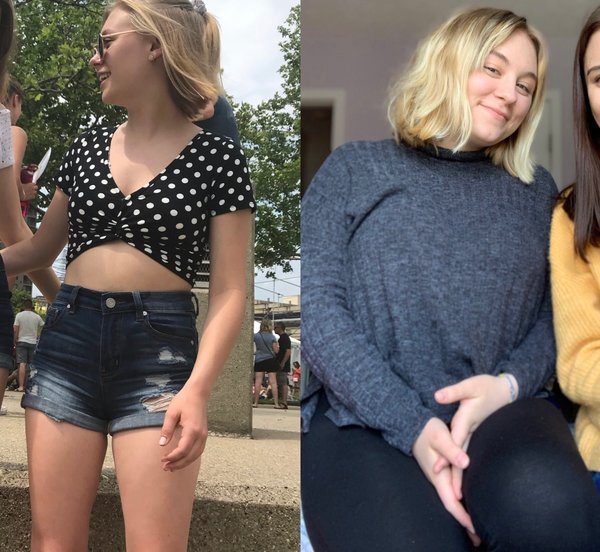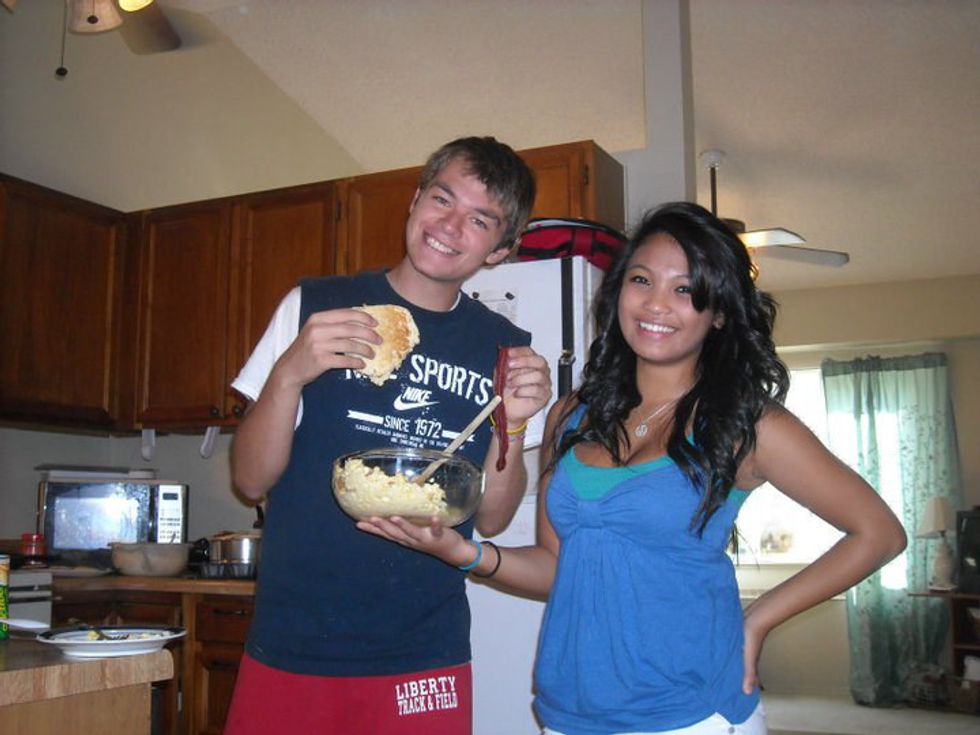“How did I get this point?” I asked myself as my body buckled into my dad’s outstretched arms.
That night I knew I had a problem. I had avoided it for months. “Guys just don’t struggle with this stuff,” I thought. “I’m not skinny enough to have a real eating disorder.”
Yet here I was, screaming in pain with tears rolling down my face. My abdomen was on fire. I felt as if my stomach was beginning to consume itself. I had never known hunger or fear as much as I had in that moment.
I had gone through that day like any other. No breakfast, because there was really no point in subjugating myself to pointless calories. Lunch was a joke. There were no friends to sit with, so I would wait alone outside my classroom until the start of Algebra I. After the bell rang, indicating the day was over, I underwent my daily commute to the locker room. I changed into my running gear and headed for the common area where the rest of my track team was assembled.
“Now I have to eat,” I confessed reluctantly as I reached into my bag for a Powerbar. “240 calories is a lot, but not too much.”
Usually I would make it through a two hour practice before one of my family members came to pick me up. I’d be tired and hungry, but nothing too serious. This practice had something much different in store for me, however.
In addition to our normal two-mile warm up, our coach decided to have us focus on sprinting hills. I was always last, but I blamed it on being fat and slow. Each hill was debilitatingly difficult. I found myself clamoring for the few seconds of rest we had while jogging down from the heights we climbed. I made it through that practice, but I was dreadfully hungry.
Normally I would return home to a cooked meal, but that night there was nothing ready when I arrived home.
“Are we eating soon?” I asked my dad. He assured me we were. But as the minutes rolled by and nothing was finished, I began to get agitated. “How much longer?” I continued to ask.
No one understood how much pain I was in until I stood up and screamed in a bout of rage at my dad for taking so long to finish our spaghetti. It was mere seconds before rage turned into stream after stream of tears as my dad held me. I expressed just how hungry I was and how much pain my stomach was in. My dad just held me as my mom came over, and they tried to comfort me until the food was finished. I managed to eat one bowl before leaving and ending my calorie consumption for the day.
My guidance counselor and my family had been poking around the concept of eating disorders for some time, but I always shrugged it off and refused to say I had any sort of problem. After all, I felt so fat and ugly. Losing weight was a necessity. Yes, I had lost almost 50 pounds in a span of six months, but to me it felt like an achievement rather than a disease. I was getting compliments, and people seemed to notice me more. The grotesque 14-year-old I saw in pictures was finally becoming palatable. Unfortunately, that night in my kitchen was just the early phase of an immense battle with eating and body image that I still struggle with today.
In the beginning, I couldn’t admit or even see that I had a problem. My society and culture painted an image of reality that said eating disorders was a “female thing.” A problem brought on by puberty for teenage girls that many grew out of. There was no understanding that guys could struggle too. I was blind.
Then there was the mixed feedback from those around me. Yes, those closest to me knew something was dreadfully wrong. Yet so many others were telling me the opposite. I would constantly received compliments on my strong sense of “self control.” I can still remember the time my grandma took us to IKEA. As we stood in line to order food, I was weighing all the options in front of me. In all honesty, the cheesecake and the Swedish meatballs were catching my eye, but in the midst of taking so long to choose, my grandma had already assumed I was going for a salad. “Oh, he eats so healthy,” she told her sister. I was creating a reputation and expectation of who I was and how I ate and lived. I had a Caesar salad without the croutons and called it a day.
While I could chronicle the entire evolution of my eating disorder as well its effects (especially in high school), I am choosing not to. I hated myself and my life was out of control. In the midst of my own self-hatred and sorrow, my eating disorder emerged. As I’ve spent the last eight years navigating the issue, I’ve learned many lessons. While many of you might guess I learned lessons like body positivity, realistic nutrition and self acceptance, the greatest lesson I learned might surprise you.
My eating disorder was real and it was ugly. Yet after a while, it offered me a sense of comfort and identity. The worse it got and the more effects it had on my body (like my hair falling out, falling over when I’d stand up or my constantly aching body), the more it became noticeable to others. I began to take on the struggle as my identity. It gave me something to define myself by when I felt like I didn’t matter or have any worth. When people would see the effects manifest in my body or my behavior, I felt like they were paying attention to me. More and more, I defined myself by my struggle without any semblance of an independent identity of who Austin was.
Eventually I realized I had a choice: I could define myself by my struggle, or I could find out who I was without it. An eating disorder was something I struggled with, but it didn’t have to be me. In this life, we will always have struggles. It can be anxiety, depression or a nagging sense of loneliness that never fades away. The reality is, everyone is struggling with something. Our struggles may be unique, but the fact that we struggle is not. We live in a culture that wants to perpetuate the cycle of struggle. We constantly define ourselves by what we struggle with. Who we are becomes inseparable from what we do.
Let me ask you a simple question. Does a dog become a fish simply because it swims?
The answer is obvious. No, a dog is a dog even when it swims. The same goes for me. Austin is Austin, even when I struggle. Yet I am not what I struggle with. My identity is so much more than a battle with eating disorders and body image. I am fiercely creative. I have a personality that is all over the place. I hate thunderstorms and I enjoy flowers. The point is, there is so much more about us than what we struggle with.
In the end, my battle taught me that I was more than my eating disorder. I realized I was more, and possessed immense meaning and value to offer the world. When I realized that, I began to slowly but surely overcome the eating behaviors I developed. The struggles with body image have been much more difficult, but I have learned to thrive above the difficulty.
We will always struggle, but we are not what we struggle with.
Whatever the struggle is for you today, know that you are more.
This is not forever. You’re life will not be defined by this one thing.
You have so much to offer, and so much in store for you.
Learn to separate who you are from what you do.
Above all, thrive above the difficulty.

























